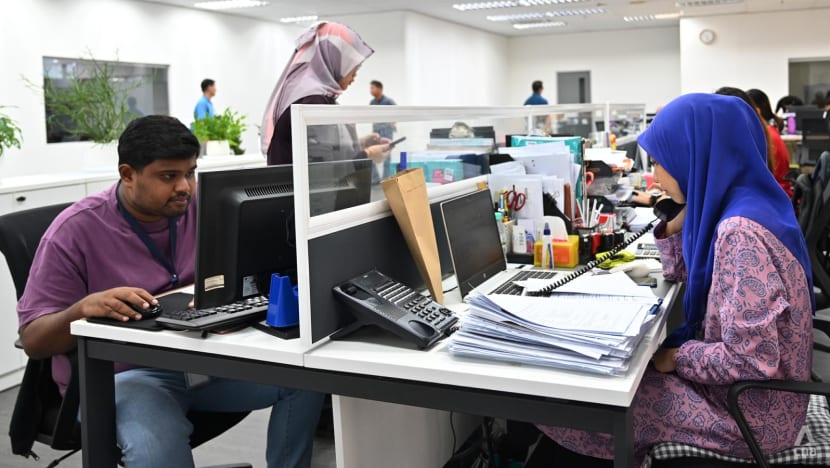No more ‘wasted’ Fridays and Sundays: Johoreans hail new weekend schedule as win-win for families and businesses
Johor's reversion to a Saturday-Sunday weekend could improve quality of life, boost leisure spending and lift the economy, Johoreans and observers told CNA.


This audio is generated by an AI tool.
JOHOR BAHRU: Since he started working in Singapore two years ago, Johorean Shariff Asrul has only been able to spend quality time with his two children once a week – on Saturdays.
The technician works day shifts at a Woodlands factory from Monday to Friday while his two sons, who are studying at Permas Jaya Secondary School in Johor Bahru, have their weekends on Friday and Saturday.
The latter policy, decreed by Sultan Ibrahim Iskandar to mark the importance of Friday for Muslims, has been in place since January 2014.
“It's quite difficult for me because on days (that) I go to work, I leave (early) when it's dark and reach home (late) when it's also dark. And even on Sundays when I’m around at home, they are in school,” said Mr Shariff, 42.
From Jan 1 next year, Mr Shariff will get more time with his family when Johor’s weekend days off revert to Saturday and Sunday.
Johor regent Tunku Ismail Sultan Ibrahim announced the change on Monday (Oct 7), which he said has the consent of the Sultan - who is also currently Malaysia’s king - and considered the views of the Johor Islamic Religious Council.
“I’m looking forward to it … more chances to spend quality family time, going out for meals, shopping, maybe even opportunities to drive to Melaka, Muar for short trips,” Mr Shariff told CNA.
The shift in weekend days off has been welcomed by most stakeholders in Johor including the state government, businesses and families, although at least one politician has opposed the move and not all companies will be changing their operations in response.
Parents and businesses told CNA it would benefit them personally as well as economically, while observers expect employers to make sufficient provisions for Muslim workers to perform Friday prayers.
Johor Chief Minister Onn Hafiz Ghazi said on Facebook on Oct 7 that the change would impact 587,343 students and 1.9 million Johoreans in the workforce. In 2022, he had noted grouses from the public on different rest days for the government and the private sector.

CHILDCARE QUANDARY FOR SOME PARENTS CURRENTLY
Parents like Mr Shariff who work in Singapore and those with jobs in the private sector in Johor lauded the change in weekend days and are looking forward to better work-life balance.
More than half the students at Permas Jaya Secondary School have parents who work in Singapore, and about a quarter have parents who work in the private sector in Johor, where weekends are on Saturday and Sunday, said Mr Mohammad Rizan Samsudin, who heads the school’s parent-teacher association.

Currently, some parents resort to asking their children to skip school on Sundays in order to fulfil commitments such as travelling back to their villages to meet extended family, he noted.
Some parents are unable to afford helpers or childcare services, and have “no choice but to leave their children at home alone on Fridays as they have to go to work”, said Mr Mohammad Rizan.
Mr Shariff said he relies on neighbours to mind his two sons on Fridays as both he and his wife are out during the day.
“With the current schedule, Fridays and Sundays are a bit wasted because we cannot enjoy these days off together as a family,” he lamented.
With the change, families’ quality of life will improve, said Dr Lee Hwok-Aun, a senior fellow from ISEAS-Yusof Ishak Institute in Singapore.
ELIMINATION OF DELAYS, MORE LEISURE SPENDING
The move will also reap economic benefits and likely boost the state’s leisure industry as well as collaboration between companies in Johor and Singapore, analysts said.
It is expected to have minimal impact on Singaporeans who visit the state on weekends, as the businesses that cater to them are already open on Saturdays and Sundays. Vehicle Entry Permit centres, where drivers go to install their radio frequency identification tags needed to enter Malaysia by land, are also open then.
With families able to enjoy more time together on weekends, Johor is likely to see spending increase in the leisure and retail sectors, which will aid its economy, former deputy minister of international trade and industry Ong Kian Ming and Mr Lee Ting Han, a representative of the Johor state government, told CNA.
Meanwhile, a workweek synced with Kuala Lumpur and Putrajaya, the private sector and neighbouring countries like Singapore will help improve overall productivity, said Mr Lee, who is chairman of the Johor investment, trade, consumer affairs and human resources committee.
It would streamline business operations and ease scheduling and coordination for trade, logistics and finance, he said.

Malaysia’s capital Kuala Lumpur and administrative centre Putrajaya have designated Saturday and Sunday as their weekends, and the upcoming alignment in schedules could smoothen operations at the government level, he said.
“Specifically on state-federal collaboration, it helps on intergovernmental tasks and communications and speeds up (the) decision-making process,” said Mr Lee.
The “pro-business move” will help companies that need to consult and communicate with the authorities, said Mr Samuel Tan, chief executive of property consultancy Olive Tree.
The new arrangement will enhance productivity and workflow efficiency and minimise unnecessary confusion, said Mr Tan, who helps facilitate foreign firms, including those from Singapore, to do business in the property sector in Johor.
“With the new initiatives like the Johor-Singapore Special Economic Zone (SEZ) and the Special Financial Zone (SFZ), we anticipate there will be more foreign multi-national corporations starting operations in Johor,” he added.
The SEZ and SFZ are proposed initiatives to boost the Johor economy through economic cooperation with Singapore, and entice major companies based in Singapore to relocate some of their operations to Southern Johor.
Having the same work week will eliminate delays in communication and decision-making, and enable smoother day-to-day interactions, meetings, and joint ventures, said Mr Lee, who is involved in SEZ discussions with the federal government and representatives from Singapore.
Johor’s weekend synchronisation with most international markets will make the state more attractive to global investors, said Ms Diana Khairuddin, a human resource consultant at HR Edge based in Kuala Lumpur.
The shift could also potentially attract talent from Singapore and around the world, and facilitate investment in sectors like logistics, retail and manufacturing, she added.

CONCERNS OVER FACILITATING FRIDAY PRAYERS
Some segments of Johor society, however, have urged the government to retain the current schedule.
Member of Parliament for Pasir Gudang Hassan Abdul Karim said in a Facebook post that Friday is a “holy day” in Islam that is highly regarded by the Muslim community. Pasir Gudang is a district in southern Johor.
The current Friday-Saturday weekend, he said, has cultural and historical meaning and the impending change “seems to disregard Johor’s understanding of its own culture and political history”.
“Johor was part of the Unfederated Malay States … and in these states, the weekend rest days are on Fridays and Saturdays,” said the politician, who is part of Prime Minister Anwar Ibrahim’s party, the Parti Keadilan Rakyat (PKR).
The five unfederated Malay states were Johor, Kedah, Kelantan, Perlis and Terengganu. This status was accorded to these states before independence as they were standalone British protected states and had different institutions from the rest of the country.
Today, Kedah, Kelantan and Terengganu observe Friday and Saturday as official weekend rest days.
Mr Hassan said that for most of Johor’s history, weekends have been observed on Friday-Saturday. The state only switched its weekends to Saturday-Sunday for the first time in 1994 when former Prime Minister Muhyiddin Yassin served as its chief minister.
Then in 2014, the state shifted to a Friday-Saturday weekend to allow Muslims to perform their prayers, as decreed by Sultan Ibrahim Iskandar. In Islam, Friday prayers are mandatory for Muslim men.
In his announcement on Oct 7, Johor regent Tunku Ismail said he has tasked Johor chief minister Onn Hafiz Ghazi and Johor’s mufti Yahya Ahmad to “discuss and study every angle and aspect regarding this matter”.
“I hope that the private sector, the government and related parties allow sufficient time and space for Muslim workers to perform Friday prayers accordingly,” he added.
On Thursday night (Oct 10), the regent issued another statement saying the decision to shift the weekend took into account the wishes of Johoreans to spend more time with their families, as well as the state’s economy.

“If there are parties upset or dissatisfied due to personal agendas, want to provoke the people or have political interests, you are welcome to move to a state that still has Friday and Saturday as weekends,” wrote Tunku Ismail.
Some businesses in Johor have chosen not to follow the shift in weekend schedule.
Dapur Jendela Cafe in Setia Tropika, a 20-minute drive from Johor Bahru’s city centre, said it would remain closed on Fridays to respect staff members who observe it as a holy day.
The cafe caters mostly to visitors and government officials who work at the nearby main immigration office. Remaining closed on Fridays from January would mean losing out on customers and revenue, it acknowledged.
“Yes, we will be impacted slightly because on Fridays there will be customers who would patronise us if we were to open,” operations manager Nor Shaliza Ahmad told CNA.
“But on reflection, many of our staff members need to observe Friday prayers so it's just fair we continue to be closed and stick to our current operating hours.”

Observers believe Johor companies will be mindful of Friday prayers and are likely to ensure that employees have sufficient time off.
ISEAS Yusof-Ishak Institute’s Dr Lee said those observing prayers should ideally be given time off – “from one hour to about 2.5 hours” – on top of their Friday lunch break.
Former deputy minister Dr Ong is confident businesses will adapt to the new arrangement, similar to what has been done in other states on the west coast of Peninsula Malaysia.
“The advantages of this alignment will outweigh any short-term disadvantages,” said Dr Ong, who is also a council member of Johor Corporation’s Cerebrum, a think tank aimed at boosting digital transformation in the state.
The adjustment is unlikely to pose a “huge challenge” to companies, especially if they offer flexible working hours, said human resource consultant Ms Diana.
Many businesses in Malaysia and Muslim-majority countries have measures such as extended lunch breaks on Friday to accommodate religious obligations while maintaining productivity, she explained.
The Department of Labour (JTK) also has clear guidelines for managing Friday prayers, making it a common practice for many companies.
“With clear policies in place, the shift can create a respectful workplace that meets both religious and operational needs,” said Ms Diana.






















